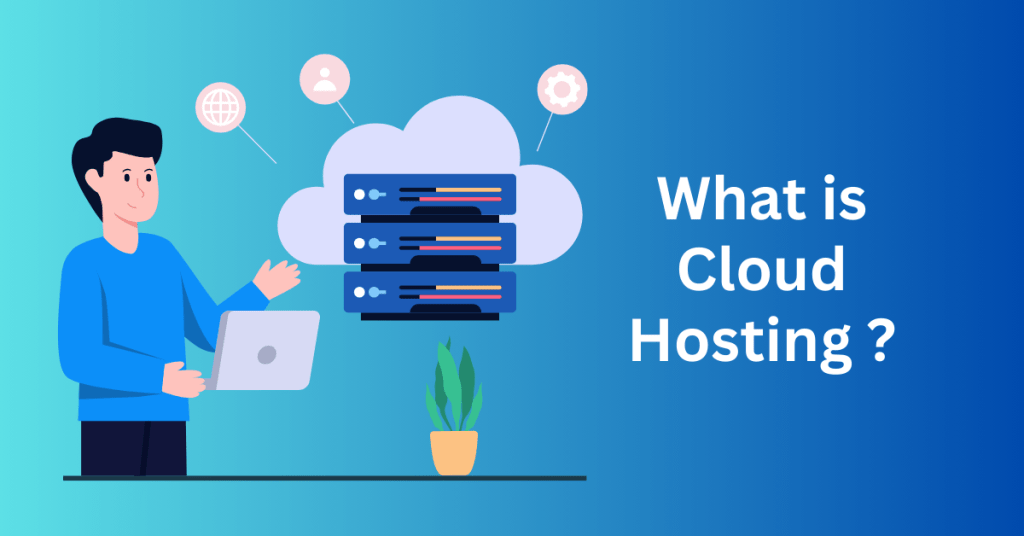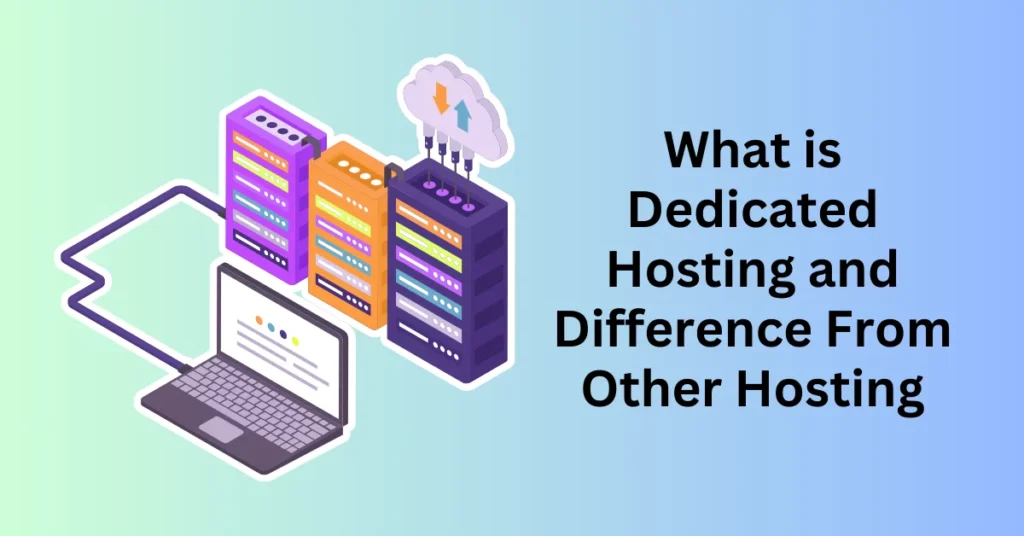Have you ever encountered terms like ‘dedicated hosting’ while searching for a web host and wondered what it truly means and why it might be crucial for your needs? If so, you’re not alone. Many people find themselves puzzled by the technical jargon surrounding web hosting, unsure of which solution best fits their requirements.
This blog aims to clarify the complexities of dedicated hosting. We will provide a comprehensive guide for individuals and small businesses looking to understand this hosting solution. We will explore the advantages, disadvantages, and key considerations to help you determine if dedicated hosting is the right choice for your website or online project.
Whether you’re managing a high-traffic eCommerce store, a growing blog, or a specialized application that needs top-tier performance and security, understanding dedicated hosting is crucial. It will give you the knowledge to make an informed decision. Let’s dive into what dedicated hosting offers and why it might be the perfect fit for your specific needs.
What is Dedicated Hosting

Dedicated hosting is a web hosting solution where an entire server—along with its CPU, memory, and storage resources—is reserved exclusively for one client or website. This arrangement gives the client full control over all server resources, configurations, and software installations. It allows for complete optimization of the server environment to meet the client’s specific needs.
In situations where a website experiences very high traffic or requires exceptional stability and performance, the owner might use multiple dedicated servers. You can configure these servers in various ways to improve performance, reliability, and redundancy.
For example, you can set up servers in a load-balancing configuration to distribute traffic evenly across multiple servers. Alternatively, you can arrange them in a failover configuration, where one server takes over if another fails. This flexibility ensures that the website can handle large volumes of traffic and maintain high levels of uptime and performance, even under heavy loads.
Dedicated hosting is ideal for businesses or websites that require strong security, high performance, and precise customization of their server environment. With exclusive access to the server’s resources, clients can implement advanced security measures, optimize performance, and tailor the hosting setup to support their specific applications and workloads.
Get Your Dedicated Hosting today
Dedicated Hosting Vs Other Hosting Options
Dedicated hosting stands apart from other hosting types like shared, VPS, and cloud hosting in several ways. It excels in serving high-traffic, resource-intensive websites or applications, while others prioritize cost-effectiveness or flexibility.
1. Shared vs. Dedicated Hosting

When comparing shared hosting and dedicated hosting, the key difference lies in how server resources are allocated and managed.
Shared Hosting:
In shared hosting, multiple websites and services are hosted on the same server, sharing its CPU, memory, storage, and bandwidth. This setup is similar to renting a room or bed space in a dormitory. Just as in a dorm, where you share facilities like the kitchen, bathroom, and living area with others, in shared hosting, your website shares server resources with other sites.
While this arrangement makes shared hosting cost-effective, it also means that other sites’ activity and resource demands can affect your website’s performance. Additionally, you have limited control over the server’s configuration and software environment.
Dedicated Hosting:
On the other hand, dedicated hosting provides a single client with exclusive access to all the server’s system resources. This is akin to renting an entire house. Just as you control how you furnish, decorate, and use the house, with dedicated hosting, you control the server’s hardware specifications, operating system, and all software applications.
This level of control allows you to tailor the server environment to meet the specific needs of your website or application, Hence, ensuring optimal performance, security, and customization.
While dedicated hosting is usually more expensive than shared hosting, it offers significant value for businesses or websites needing high performance, scalability, customization, and strong security. Dedicated hosting eliminates the potential slowdowns and security risks associated with sharing a server with other websites. This makes it an excellent choice for high-traffic websites, e-commerce stores, or any online platform requiring reliability and top-tier performance.
2. VPS vs. Dedicated Hosting

Virtual Private Server (VPS) hosting and dedicated servers each offer distinct advantages. Both cater to different hosting needs based on performance, control, and resource allocation.
VPS Hosting:
VPS hosting involves dividing a single physical server into multiple virtual servers. Each with its own allocated resources like CPU, memory, and storage. This setup lets users access a dedicated portion of the server’s resources, even though multiple users share the physical server.
To illustrate, think of VPS hosting as leasing an apartment within a large complex. You have your private space and a certain level of control over it. However, you still share the building’s overall infrastructure, such as the lobby, elevator, and utilities, with other tenants.
VPS hosting offers a balance between cost-efficiency and customization. It provides more control and resources than shared hosting while being more affordable than a dedicated server.
Dedicated Hosting:
In contrast, dedicated hosting provides exclusive access to an entire physical server. This is like renting a standalone house, where you have full control over all the resources and can use them as you see fit without sharing with others. Dedicated hosting offers the highest level of performance, security, and customization. All of the server’s resources are dedicated solely to your website or application.
Key Differences:
While VPS hosting is a cost-effective solution that strikes a good balance between customization and resource allocation, it still involves sharing the underlying hardware with other users. This sharing can impact performance during peak times.
In contrast, dedicated hosting excels in resource exclusivity. This makes it a solid investment for businesses requiring top-tier performance, scalability, security, and full control over their server environment. For websites or applications with high traffic, complex needs, or strict security requirements, dedicated hosting provides the reliability and power necessary to support operations effectively.
3. Cloud hosting vs. Dedicated Hosting

Both Cloud hosting and dedicated hosting are two distinct approaches to web hosting. Each offers unique benefits depending on your needs for flexibility, performance, and control.
Cloud Hosting:
Cloud hosting uses a network of virtual servers to dynamically distribute resources across multiple servers based on demand. This setup is similar to living in a modern, shared co-living space, where utilities and common areas are allocated as needed, and you pay only for what you use.
Cloud hosting offers exceptional flexibility and scalability. This allows you to adjust resources such as CPU, memory, and storage in real-time to accommodate traffic spikes or changing needs. The pay-as-you-go model is ideal for businesses that need the ability to scale quickly without committing to a fixed amount of resources.
Dedicated Hosting:
In contrast, dedicated hosting involves the exclusive use of an entire physical server for a single client. This is comparable to owning your private residence, where you have full control and dominion over every aspect of the property. With dedicated hosting, you have complete access to all server resources, including CPU, memory, and storage, without sharing them with any other users. This ensures consistent, high performance, and provides the highest level of customization, security, and autonomy.
Key Differences:
While cloud hosting excels in offering flexibility and scalability through its distributed resource model, dedicated hosting stands out in resource isolation and performance. Businesses that demand uncompromising site speed, customization, and security, as well as full control over their hosting environment, may find dedicated hosting to be the superior choice. It’s particularly well-suited for high-traffic websites, mission-critical applications, and organizations that prioritize having an isolated and highly customizable server environment.
Get Your Dedicated Hosting today
Advantages of Dedicated Hosting
Dedicated hosting offers several compelling benefits that make it an optimal choice for businesses with demanding requirements.
1. High Performance:
With dedicated hosting, all server resources—CPU, memory, and storage—are allocated exclusively to one or a select few websites or applications. This exclusivity ensures fast loading times, low latency, and consistent performance, even during peak traffic periods. The result is a smooth user experience, which is crucial for businesses that rely on high-performance websites or applications.
2. Customization:
Unlike shared hosting, dedicated hosting provides unparalleled flexibility, allowing you to fully customize your server environment. You can choose the exact hardware specifications, operating system, software, and security protocols that best meet your specific needs. This level of control enables you to optimize the server for your unique use case, whether it’s running resource-intensive applications, maintaining stringent security standards, or supporting complex configurations.
3. Reliability:
Since your server resources are not shared with other websites or applications, you avoid the performance issues and potential downtime that can occur in shared hosting environments. Dedicated hosting offers unmatched reliability and uptime, ensuring that your website or application remains accessible and responsive at all times. This is especially important for businesses where downtime could result in lost revenue, customer dissatisfaction, or damage to reputation.
4. Security:
Dedicated hosting reduces security risks by eliminating the need to share a server with other tenants, as is the case with shared hosting. This isolation allows you to implement custom security measures tailored to your specific needs, such as custom firewalls, intrusion detection systems, and access controls. You can also restrict access to the server, further enhancing security and safeguarding sensitive data from potential breaches.
5. Dedicated Support:
Dedicated hosting providers typically offer premium, specialized support to their customers. Unlike shared hosting, where support is often handled through general channels like tickets or live chat, dedicated hosting often includes access to dedicated support channels with agents who have deep expertise in managing and troubleshooting dedicated servers. This ensures that any issues are resolved quickly and efficiently, minimizing disruption to your business.
6. Compliance:
For businesses in regulated industries, such as healthcare, finance, or eCommerce, dedicated hosting is crucial for meeting compliance requirements. For example, healthcare businesses must comply with HIPAA. eCommerce sites handling payments need to adhere to PCI DSS standards. Dedicated hosting allows you to configure your server environment to meet these regulations. This ensures peace of mind and reduces the risk of non-compliance penalties.
7. Cost-Effectiveness:
While dedicated hosting typically comes with a higher upfront cost compared to shared hosting, it can be more cost-effective in the long run. The enhanced performance, reliability, and scalability of dedicated hosting can boost revenue by reducing disruptions and handling higher traffic volumes. Moreover, preventing downtime and security breaches can save significant costs related to lost revenue, data recovery, and damage to customer trust.
Overall, dedicated hosting is an investment that can provide substantial returns for businesses that prioritize performance, security, and control.
Disadvantage of Dedicated Hosting
While dedicated hosting offers significant benefits for high-traffic websites, it also comes with some notable drawbacks. Here are a few disadvantages to consider when opting for a dedicated server:
1. High Costs:
Dedicated hosting is generally more expensive than shared or cloud hosting. This is because you’re paying for exclusive access to the server’s resources. The costs can add up quickly, especially when factoring in the need for premium hardware, software, and additional services that may be required to optimize your server.
2. Maintenance and Management Responsibility:
With a dedicated server, you are responsible for maintaining and updating both the server’s hardware and software. This includes regular maintenance tasks, security updates, and troubleshooting. Managing a dedicated server can be time-consuming and requires a certain level of technical expertise. If you don’t have in-house IT staff, you may need to hire professionals or opt for managed services, which can further increase costs.
3. Limited Scalability:
While a dedicated server allows you to scale within its existing performance limits, going beyond those limits can be challenging. Unlike cloud hosting, where resources can be dynamically adjusted, scaling a dedicated server often involves upgrading hardware components or even migrating to a more powerful server. This process can be expensive, time-consuming, and disruptive, turning what should be a seamless growth phase into a logistical challenge.
These drawbacks highlight that while dedicated hosting is powerful and customizable, it’s essential to weigh these factors against your organization’s needs and capabilities before committing to this type of hosting solution.
Who Should Get Dedicated Hosting?
If your business has specialized needs and high bandwidth requirements, a dedicated server is often the ideal solution. It’s particularly beneficial if you have the technical expertise to fully utilize the extensive customizability that dedicated hosting offers.
Here are the top candidates for dedicated servers:
1. High-Traffic Websites:
Websites with a large volume of visitors, such as popular blogs, news sites, or entertainment platforms, may require a dedicated server to efficiently manage high traffic levels. The exclusive resources of a dedicated server ensure that your website remains fast and responsive, even during peak usage periods.
2. eCommerce Websites:
For eCommerce sites that handle sensitive information, like customers’ credit card details and personal data, a dedicated server offers enhanced security measures. This increased protection is crucial for safeguarding customer data and maintaining trust. In an environment where security breaches can lead to significant financial and reputational damage, having robust security is essential.
3. Data-Intensive Organizations:
Organizations that handle large amounts of valuable or sensitive data—such as financial institutions, healthcare providers, or research organizations—are better served by a dedicated server. Dedicated hosting offers enhanced security and control. This helps protect critical data from unauthorized access, breaches, and other cyber threats.
4. Custom Software Requirements:
If your organization relies on custom software that shared hosting cannot support effectively, a dedicated server may be necessary. Dedicated hosting allows you to install and run software applications with specific configurations. This ensures that your software operates smoothly and efficiently, without the limitations often encountered in shared environments.
5. Websites Requiring High Customization:
Websites that require high levels of customization and control—such as those with complex architectures, specialized databases, or unique content delivery needs—can benefit greatly from a dedicated server. Dedicated hosting gives you the freedom to configure every aspect of the server to meet your precise requirements. This allows you to optimize performance and functionality.
In summary, dedicated servers are ideal for businesses and organizations with high traffic. They are also well-suited for those with stringent security needs, custom software requirements, or a need for extensive control and customization. If you have the technical knowledge to manage and optimize a dedicated server, you can fully leverage its capabilities. This will support your specialized needs and advance your business.
How To Choose Your Dedicated Hosting Provider

Choosing the best dedicated server hosting provider for your organization can be a daunting task, especially with the multitude of options available, each offering different pricing plans, features, and products. To make the selection process easier and more effective, follow these seven steps:
1. Determine Your Hosting Needs
Start by assessing your website’s specific needs. Consider the type of site you operate, the expected traffic volume, and the resources required to support it. Look for hosting providers that offer cutting-edge hardware. This includes DDR5 memory for faster processing, ultra-fast NVMe SSD storage drives for quick data access, and PCIe 5.0 technology for high-speed data transfer between components. These features will ensure your server can handle your website’s demands efficiently.
2. Server Management
Decide whether you want to manage the server yourself or prefer a fully managed service where the hosting provider handles all server management tasks. Look for providers that offer the level of management you need, whether it’s unmanaged, semi-managed, or fully managed solutions. For optimal performance, consider providers that offer dedicated resources, a 10 Gbps network with unmetered bandwidth, and plans that can be easily scaled as your needs grow.
3. Server Security
Security is a top priority when choosing a dedicated server. Look for hosting providers that offer comprehensive security measures, including DDoS protection, SSL certificates, firewalls, malware detection, and intrusion prevention systems. These features will help protect your website and sensitive data from cyber threats and unauthorized access.
4. Server Uptime
Reliability is crucial, so it’s important to choose a hosting provider that guarantees high server uptime. Aim for a provider that offers a 99.9% or higher uptime guarantee, ensuring that your website experiences minimal downtime or service disruptions. High uptime is essential for maintaining user trust and ensuring uninterrupted access to your site.
5. Customer Support
Reliable and responsive customer support is vital, especially if you encounter server issues or technical problems. Look for hosting providers that offer 24/7 customer support with multiple channels like phone, chat, and email. Additional support features such as guided server setup, an onboarding call, and free migration services can be incredibly valuable, particularly if you’re transitioning from another hosting provider.
6. Pricing
While it’s important to find a dedicated server that fits your budget, you should also consider the value offered by each provider. Compare pricing plans from the shortlisted providers, taking into account the resources, features, and support included in each plan. Strive to find a balance between cost and value, ensuring you get the most out of your investment.
7. Additional Features
If you’re torn between two providers, consider the extra features they offer. Look for added benefits like a free dedicated IP address. Check if they provide full root access for greater control. A user-friendly dashboard for easy management is also important. One-click app installers can offer added convenience. Other useful features might include backup and recovery services. Look for load-balancing options and access to content delivery networks (CDNs). These features can enhance site performance and security.
By following these steps, you can narrow down your options and select a dedicated server hosting provider that best meets your organization’s needs, offering the right combination of performance, security, support, and value.
Get Your Dedicated Hosting today
Misconceptions of Dedicated Hosting

There are several misconceptions about dedicated servers that can lead to misunderstandings about their benefits and drawbacks. Let’s clarify some of these common myths:
1. Dedicated Hosting is Expensive
While dedicated servers are typically more costly than shared or VPS hosting due to the exclusive access to resources, the notion that they are prohibitively expensive isn’t entirely accurate. Hosting providers like Bluehost offer a range of pricing plans that cater to different needs and budgets. With these options, you can customize your resources and management level, ensuring that the cost aligns with your specific requirements. Plus, some plans include maintenance and updates, adding value to the investment.
2. Set Up and Manage a Dedicated Server is Complicated
It’s true that dedicated servers require a certain level of technical expertise, but this doesn’t mean they are inaccessible. With the right learning resources, tutorials, and a bit of patience, most individuals can learn to manage their servers effectively. Additionally, many hosting providers offer managed services, where they handle the more complex aspects, making dedicated hosting a viable option even for those without deep technical knowledge.
3. Dedicated Hosting is Only for Large Businesses
Large businesses often use dedicated servers to handle high-traffic volumes and complex needs. However, they are not the only ones who can benefit. Any website owner needing greater control over their hosting environment can find value in a dedicated server. This includes those running an eCommerce site, a growing blog, or a specialized application. Dedicated hosting provides the reliability and customization you need for improved performance and enhanced security.
4. All Hosting Providers Offer the Same Service
Not all hosting providers are created equal. There are significant differences in the quality of customer service, hardware, network uptime, data centre locations, and security measures offered by different providers. It’s crucial to research and compare hosting providers based on your specific needs to find the best match for your situation.
5. Dedicated Servers Are Always Faster
Dedicated servers usually provide superior performance compared to shared or VPS hosting due to their dedicated resources. However, speed and performance also depend on other factors. These include the server’s specifications, such as CPU, RAM, and storage. The quality of the network infrastructure and how well the server is optimized are also crucial. Simply having a dedicated server does not automatically guarantee the fastest performance.
6. Dedicated Servers Don’t Experience Downtime
Although dedicated servers tend to be more reliable than shared hosting, they are not immune to downtime. Hardware failures, network issues, or other unforeseen events can still cause disruptions. It’s essential to choose a reliable hosting provider and have a robust disaster recovery plan in place to mitigate potential downtime.
In conclusion, it’s important to approach dedicated hosting with a clear understanding of its benefits and potential challenges. Thorough research and careful consideration of your hosting needs will help you choose the best solution for your website or business.
Final thoughts: What is Dedicated Hosting and Difference From Other Hosting
In conclusion, dedicated hosting offers unparalleled control, security, and performance, making it an ideal choice for websites with high traffic, resource-intensive applications, or specific security requirements. Unlike shared or VPS hosting, where resources are divided among users, dedicated hosting provides exclusive access to an entire server, ensuring optimal performance and customization. While it comes at a higher cost, the investment is often justified for businesses that require top-tier hosting solutions. By understanding the differences between hosting options, you can make an informed decision that aligns with your website’s needs and future growth.
If you’re looking for a reliable dedicated hosting provider, consider Bluehost. With prices starting as low as $141.19/month and 24/7 support from a dedicated team.


